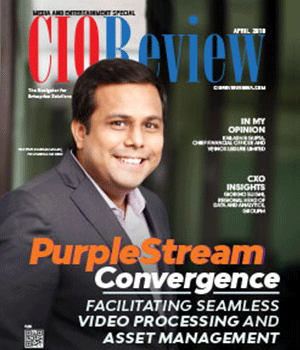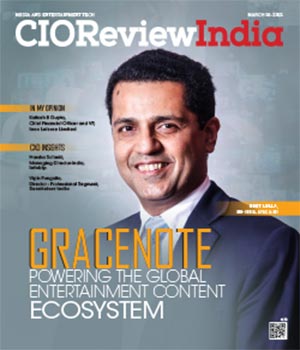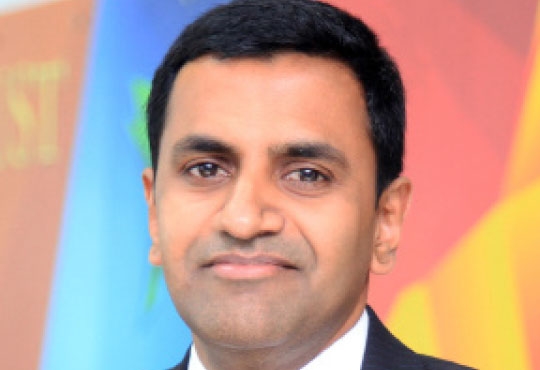
The Disruptive Potential of Blockchain in Media and Entertainment
Damodar Sahu, Consulting Partner & Head, Wipro | Wednesday, 07 February 2018, 04:06 IST
 Blockchain is currently one of the most widely discussed and hyped technologies. Many readers are familiar with Blockchain as the underlying enabling technology developed for Bitcoin, a cryptocurrency. Klaus Schwab, founder and executive chairman of the World Economic Forum, provides this summary in his book on the Fourth Industrial Revolution. “In essence, the Blockchain is a shared, programmable, cryptographically secure and therefore trusted ledger which no single user controls and which can be inspected by anyone.” This much is certain that Blockchain has the potential to disrupt existing but also to enable new business models.
Blockchain is currently one of the most widely discussed and hyped technologies. Many readers are familiar with Blockchain as the underlying enabling technology developed for Bitcoin, a cryptocurrency. Klaus Schwab, founder and executive chairman of the World Economic Forum, provides this summary in his book on the Fourth Industrial Revolution. “In essence, the Blockchain is a shared, programmable, cryptographically secure and therefore trusted ledger which no single user controls and which can be inspected by anyone.” This much is certain that Blockchain has the potential to disrupt existing but also to enable new business models.
Blockchain has the potential to become a powerful disruptive force. A survey of 800 executives, featured in the same book of Klaus Schwab, suggests 58 percent believe that up to 10 percent of global GDP will be stored using Blockchain technology. Blockchain technology may provide several important features that could be leveraged for use in the creative economy. Blockchain is –
• Reliable and available
• Transparent
• Immutable
• Irrevocable
• Digital.
Blockchain solves a number of challenges by integrating and converging a list of critical technologies and services. These include:
• Large database technology
• Distributed/Decentralized accounting ledgers that use technology to track every detail of a transaction
• Cryptography to protect digital transactions against hacking
• High speed Internet networking and connectivity to virtually any device
• Internet of Things (IoT) where almost any device can be network addressable and enabled (machines to machines communications)
• Mobility of data, digital applications and convenience of computing, and
• Open systems that rely upon more transparency and collaboration, vice monolithic and proprietary walls-of-separation.
Blockchain Technology for Media & Entertainment Industries – Blockchain is initially developed for the use in the Financial Services but later it is proving beneficial to other industries too. For the Media & Entertainment industry, it is going to hit hard, just like the Internet. Blockchain makes it easier for artists to receive compensation while improving the way consumers access media. Blockchain as a platform to protect artist rights –
• Enable Smart Contracts
• Establish transparent person-to-person transactions
• Establish a reputation system
• Promote dynamic and efficient pricing
• Allow micrometering and micromonetizing
Particularly for the media industries, that has been heavily affected by the ubiquitous availability and the subsequent “commoditization” of content and been undermined by widespread piracy of intellectual property (IP). Media users are largely accustomed to having free access to a wide variety of content, and most of them are still reluctant to pay subscription fees for “premium” content behind paywalls. In addition, all media segments have suffered significantly from digitization, since content can be copied and distributed easily and without loss of quality. So far, the introduction of Digital Rights Management systems has not substantially reduced copyright infringements. It gives listeners access to music on whatever player they choose, while ensuring that artists receive as much revenue as possible. Blockchain could also make it easier to access media by bypassing some of the geographical limitations on services like Netflix and Spotify. A decentralized ledger isn’t kept in any particular location, so the days of regional broadcasting contacts might be coming to an end.
In fact, if media companies embrace the efficiencies in rights management, payment collection, and additional distribution channels enabled by Blockchain, they can spend more time focusing on what they’re relatively good at making and marketing content.
The Future of Entertainment Industry of the 21st century is Blockchain technology, an innovation that can digitally support a dynamic and connected global network of content producers, distributors and audiences.
The entertainment industry has grown exponentially over the years. As a result, a status quo has become established in which company executives and the top tier of artists make enormous sums of money. The internet has already started to change things, allowing a much broader swathe of creators to find an audience. However, big problems still exist in terms of revenue, with distribution services and piracy both cutting down on the amount of money that actually ends up in the artists’ hands.
Ultimately, effective use of Blockchain technology could make the entertainment industry fairer and more equitable, while also introducing practical advances that change the way that we consume media.
How the Blockchain could Help
• A Blockchain could be used to store a cryptographic ‘hash’ of the original digital music file, associating it with the addresses – and potentially, the identities- of the people involved in its creation.
• The Blockchain could also store the instructions, in the form of a smart contract, for how the artists would be compensated for the song or music.
• Now it’s a whole lot of technical stuffs are also involved in, this is not the end just the starting uses of Blockchain technology. As this technology will evolve more and more new idea will come up and revolutionize these industries.
Let’s gets started with this technology and see where it can lead us.
CIO Viewpoint
Technology changing landscape of Media and...
By Kailash B Gupta, Chief Financial Officer and VP, Inox Leisure Limited
How Digital and AI is re-defining customer...
By Rajat Tyagi, CIO & Digital Business Head, PVR
Need of Information Security in Today's World
By Sriram Naganathan, President – IT & Digital Initiatives, Liberty Videocon General Insurance Company
CXO Insights
Post-Pandemic Marketing: Why Omnichannel...
By Harsha Solanki, Managing Director-India, Infobip
The Future Of The Workplace Design And The...
By Vipin Pungalia, Director - Professional Segment, Sennheiser India
Taking Businesses To The Next Level By...



.jpg)
.jpg)





